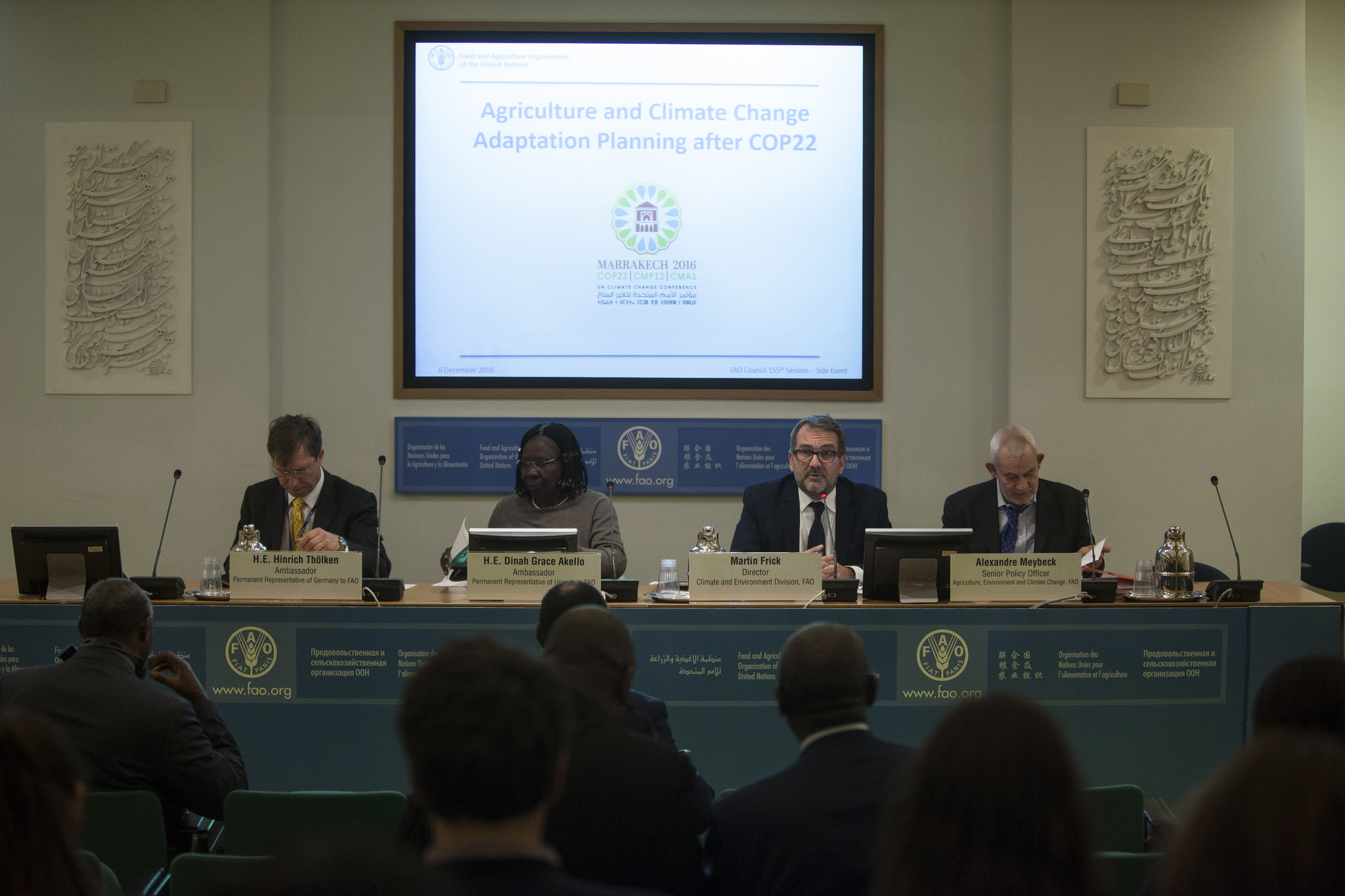Food Security at the heart of National Adaptation Plans

Rome, 6 December, 2016, - How countries will ensure their food security now and in the future will depend on how they respond to increasing weather variability, extreme events and temperature variations. This was the main topic discussed during the side event “ – Highlights from the FAO-UNDP NAP-Ag Programme“ parallel to the FAO Council.
The side event focused on the work being carried out within the FAO and UNDP Programme on “Integrating agriculture in National Adaptation Plans” (NAP-Ag programme). Countries shared their views and experiences on measures to adapt agriculture to climate change and on how to integrate them in national adaptation processes and plans.
Martin Frick, Director to the Climate and Environment Division, presented the results of the 22nd Conference of Parties to the United Nations Framework Convention on Climate change (UNFCCC COP22) in relation to climate change adaptation and their implications for agriculture. The panelists highlighted the relevance and the timeliness of the NAP-Ag programme. The Programme supports 11 countries to advance in integrating agriculture sectors into their national climate actions.
As part of the panel, Alexandre Meybeck, Senior Policy Officer at FAO highlighted that “agriculture sectors are critical to the accomplishment of the Paris Agreement and the Sustainable Development Goals (SDGs). Agriculture is key to food security and is at the heart of adaptation as the biggest employment sector worldwide and the most impacted sector by climate change. This is why most of the countries that include adaptation into their Intended Nationally Determined Contributions (INDCs) to the Paris Agreement emphasize agriculture and food security.”
He also recalled that it will require at the same time immediate action and long term planning and that land use as well as water use interact with many other sectors. This is why it is important to integrate well agriculture sectors and actors in adaptation strategies, planning and budgeting, putting forward the importance to have agriculture in the NAP discussions.

Uganda’s experience
The Permanent Representative of Uganda to FAO, Dinah Grace Akello shared Uganda’s experience and recent efforts to ensure food security under climate change. She recalled the dependence the country’s livelihoods has on its natural resources and how these are being severely impacted by climate change. The Government of Uganda has prioritized response to climate change challenges by developing the National Climate Change Policy (NCCP), setting up the Climate Change Department (CCD) to coordinate implementation of the policy, formulating National Adaptation Programmes of Action (NAPAs) and preparing guidelines for mainstreaming climate change in sector plans and budgets and started working on the formulation of the agriculture component of the National Adaptation Plan (NAP).
According to the Permanent Representative of Uganda, “with support from FAO, the Government of Uganda addressed mainstreaming of climate change challenges in its second National Development Plan. FAO also provided technical support in the development of Uganda’s Nationally Determined Contributions (NDCs). Uganda’s NDCs have been submitted with clear priorities for adaptation measures.”
Germany’s commitment in climate action
The Permanent Representative of Germany to FAO, Hinrich Thölken, explained how the country is supporting climate action through FAO and other international agencies. Thölken highlighted Germany’s commitment to support both adaptation and mitigation. He stressed the uniqueness and importance of the UNDP-FAO joint programme on mainstreaming agriculture in adaptation.
Finally, during the discussions, the Permanent Representative of the Philippines as one of the countries participating in the NAP-Ag programme, expressed his appreciation of the capacity building power of the programme in his country.
As the climate clock is ticking, discussions all highlight the urgency for implementation of concrete climate actions and the importance to include agriculture sectors into national climate processes. The NAP-Ag programme aims at answering these urgent needs to adapt to climate change and ensure food security for all.

